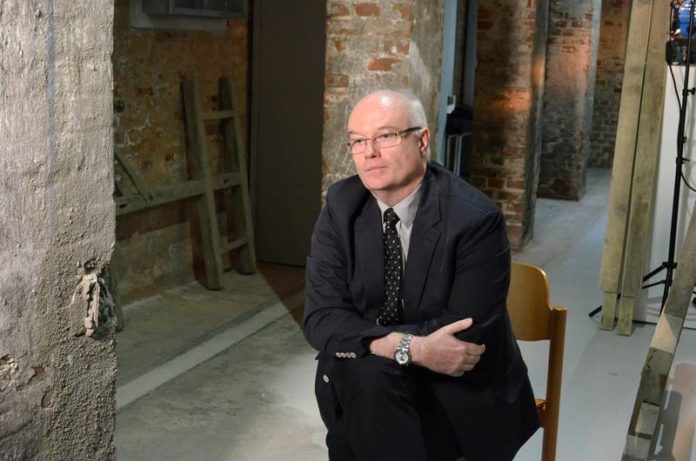Towards Transnational Remembrance and Reconciliation
May/14/2018 Archived in:Armenian Genocide

Prof. Volkhard Knigge
by Muriel Mirak-Weissbach
FRANKFURT, Germany, MAY 11, 2018— Armenians who gathered in Frankfurt’s historic Paulskirche this year for the traditional commemoration of the 1915 genocide were among the first to join in prayer with the new Primate of the Armenian Church in Germany, Archimandrite Serovpe Isakhanyan. He was elected as the successor to Archbishop Karekin Bekjian on April 15, and confirmed by Catholicos Karekin II on April 19. Another novelty was the presence of two representatives of the Armenian youth community. And a very special guest was Hrachuhi Bassenz, world famous opera singer.
Following a piece by Komitas, Shushiki, performed on the piano by Diana Sahakyan, opened the solemn ceremony on a stern note; he spoke of criminals who today continue to deny the genocide occurred, and characterized the ongoing expulsion of Kurds as a continuation of the tragedy the Armenians suffered a century ago. As the cases of Hrant Dink and persecuted German-Turkish author Dogan Akhanlı show, he said, the perpetrators are still active. To be sure, Germany has recognized the genocide officially, in 2016, but the clauses of that act of Parliament await implementation. Concretely he called for a genocide monument to be erected in Berlin and for study of the Armenian genocide to become part of the school curriculum.


Hrachuhi Bassenz
Mayor Uwe Becker said, with reference to the 2016 landmark resolution, that it proved one cannot rewrite history. One must learn from history, he said, with a view to the ongoing plight of the people of Afrin, and urged Europe not to remain idle.
Bassenz presented Garuna and Hov Areq by Komitas, after which Ambassador Ashot Smbatyan spoke. Denial of the genocide, he said, is something that is damaging also to the Turkish people, in the sense that it hinders them from dealing truthfully with their own history. Raising the question of whether or not we have witnessed cultural progress over the past decades, he pointed to the continuing violence, expulsions and killing taking place in Syria; the crimes of the past are being repeated.
The commemorative speech was delivered by Prof. Volkhard Knigge, Director of the Büchenwald Memorial Foundation. Prof. Knigge developed the transnational dimension of remembrance culture, drawing comparisons between the Armenian genocide and the Holocaust. In Büchenwald, he said, they have succeeded in identifying 35,000 names of victims and among them have found 30 Armenians – who had previously been misidentified as Turks. Citing the oft-quoted remark by Hitler, in his plans to exterminate the Jewish population, to the effect that no one remembered the Armenians, he traced a line of continuity from the genocide to the Holocaust. There were some survivors of Büchenwald, he said, who, upon liberation from that concentration camp, swore a solemn oath to the effect: “We want to build a new world of peace and humanity.”
As for the German role in the genocide, Knigge distinguished between those diplomats like Ambassador von Wangenheim who opposed the massacres and those like Chancellor Bethmann-Hollweg, who accepted them as part of the price for the wartime alliance with the Young Turk regime. If military officers like Fritz Bronsart von Schellendorf and Hans Humann actively supported the genocide policy, there were Germans like Johannes Lepsius and Armin Wegner who mounted a resistance.
To present his concept of transnational remembrance, Prof. Knigge took the example of Stephen Hill, a British Jew who survived Büchenwald. Hill worked with others on the Declaration of Human Rights and called for a “transnational suffering remembrance,” whereby one derives self-consciousness from one’s own past of suffering, transposing it to a transnational level. In this connection he recalled the mass demonstrations of Turkish citizens in honor of Hrant Dink.
At the conclusion of the main address, Hrachuhi Bassenz sang Antuni by Komitas, and she was followed by two young Armenians. Vardan Lulukjan focused on the task of the younger generation to keep the memory of the past alive, and to address contemporary crimes, like those perpetrated against Christians in Syria as well as Rohingya Muslims in Myanmar or Yezidis in Iraq. Berta Arapoglu focused on the implementation of the genocide resolution, listing 5 concrete demands: genocide instruction in schools, banning speeches by denialists, genocide monuments in major cities, fighting injustice and supporting democracy in Turkey.
Diana Sahakyan performed Tsirini tsar by Komitas, after which Archimandrite Isakhanyan gave a moving speech, before concluding with solemn prayers. As a Christian, he said, he believes in a God of reconciliation, forgiveness and righteousness. Turks are not to be our enemies eternally, we will be able to forgive not only as Christians but as human beings. Forgiveness, he said, is a step towards healing sickness, the sickness of hatred which was expressed in the assassination of Hrant Dink. This must be overcome.

